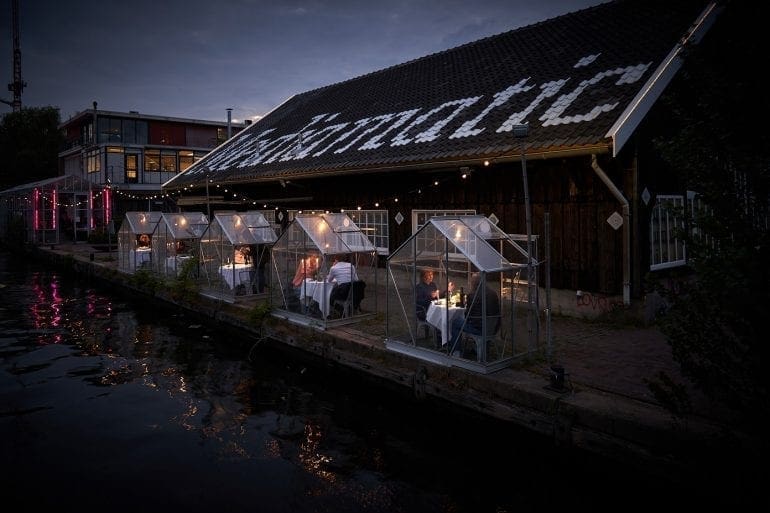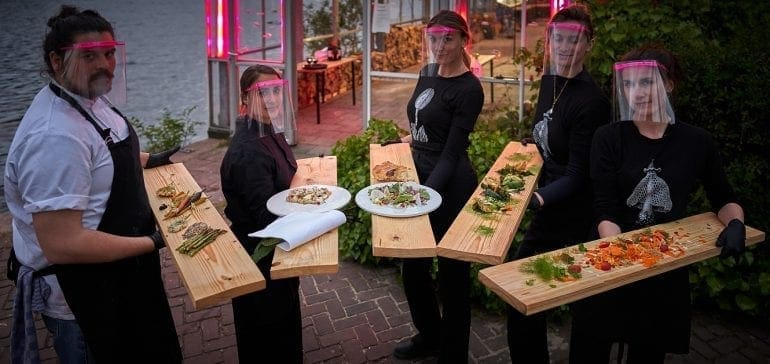The future of our restaurants is in question. Over the last two months, owners and chefs have battled everything from state-mandated shutdowns to restrictions on alcohol sales. For the customer, the financial fallout of the global pandemic has even shifted the core of how they eat. Will face masks and temperature checks at half capacity be the new norm? Opinions differ about how (and when) restaurants can offer dine-out services again.
Some hospitality industry experts are predicting increases in ghost kitchens or utilizing smartphones to share a customer’s health data before stepping into a dining room. A restaurant located in the Netherlands named ETEN tested a pop-up that consists of mini glasshouses for partners to reconnect and enjoy the dining experience with the outside world at their leisure. Servers minimize human contact as much as possible. Overall, the staff is able to deliver food to guests from an appropriate 6-foot distance through the door enclosed.

Mediamatic Amsterdam | Photo by Anne Lakeman, Willem Velthoven
Conversation sparked earlier this week on when exactly New Jersey restaurants will be able to reopen. The New Jersey Restaurant and Hospitality Association—a non-profit organization dedicated to supporting and advocating for restaurants, as well as those in the industry—proposed a seven-page plan to reopen restaurants starting later this month and operating at 50 percent capacity.
The plan outlines three stages:
- Stage one is our current situation with strict guidelines in place with only delivery and takeout available.
- Stage two is restaurants opening at 50 percent capacity with seating limited to no more than eight guests, face masks required for guest-facing staff but not required for customers and other precautions to minimize contact.
- Lastly, stage three has a targeted date for July 1 that allows restaurants to open at full capacity with some guidelines still enforced like guests with a cough or fever are prohibited and establishments must be diligent in following sanitation procedures.
The plan has been submitted to Governor Phil Murphy’s office, but there’s no clear answer about when it will be carried out.
Ryan DePersio, owner and executive chef of Fascino (Montclair), Battello (Jersey City) and Kitchen Step (Jersey City), currently only has Fascino operating yet he plans to open Battello the week of May 18 and Kitchen Step the week after.
DePersio is keeping an open mind and notes that he’ll adapt and do what it takes if they want to survive but in a refined manner for customers. “I can use my skills as a chef to produce incredible food but as a business owner, my street smarts will keep my head afloat knowing I have a family to support,” he explained.

Ryan DePersio at Battello’s 2019 Reopening in Jersey City, NJ | Photo by Maged Samuel
If and when restaurants are allowed to operate at 50 percent capacity, DePersio plans to do so in addition to continuing takeout and delivery for all his restaurants. However, he is unsure about what that image will look like, “Will we get slammed knowing people are stir-crazy to get out, or will they be scared to be in public without a vaccine? Time will tell.”
Restaurants have adapted to today’s global pandemic by providing creative solutions, with many offering takeout, delivery, DIY kits and more. Empty shelves at grocery stores are even creating the opportunity for restaurateurs to generate revenue by selling their own produce and inventory.
Fascino, as of three weeks ago, is the only one of DePersio’s restaurants currently open where he is operating four days a week (Thursday to Sunday), offering family-style pre-set meals as well as the restaurant’s produce, dairy and homemade sauces and pasta.
Robbie Felice, partner and executive chef of Viaggio (Wayne) and Osteria Crescendo (Westwood), acted similarly and continues to adapt to his customers’ needs. “The day after the pandemic hit, we turned Viaggio into a market. Since then, I have done away with the market as I feel we got what we needed out of it. Everyone is doing it now,” Felice said. “We then converted Viaggio into a sandwich shop to keep up with the needs of people wanting cheaper comfort food.”

Robbie Felice at Osteria Crescendo in Westwood, NJ | Photo by Peter Bonacci
Felice’s sandwich shop concept includes creative takes on classic Italian sandwiches like his True Italian Panino—a signature consisting of ciccioli from a whole roasted pig head, fontina cheese and garlic crema. While certainly helpful, these initiatives and operations aren’t necessarily enough for most small businesses to survive for the foreseeable future. In fact, many restaurants have decided to close for good, especially across the river in New York City. Felice—a 2020 James Beard Award Semifinalist for Rising Star Chef of the Year—believes that close to 40 percent of restaurants will close permanently and ones that are still open, will not be able to go back to their normal function even if restrictions are removed.
It’s still unclear about what the new norm will look like. Many New Jersey restaurants saw an increase in communal tables in recent years, but will likely lean in the opposite direction going forward. It would be interesting to see if restaurants, especially those in bigger cities, choose to follow a layout similar to ETEN of “separate greenhouses” which might prove to be successful in driving business.

Mediamatic Amsterdam | Photo by Anne Lakeman, Willem Velthoven
As restaurateurs like Depersio and Felice continue to come up with creative takeout solutions to weather the storm, it’s uncertain when (and if) The New Jersey Restaurant and Hospitality Association plan will be executed. With a predicted second wave of COVID-19 to pop up in the fall, there are certain restaurant-goers who simply aren’t comfortable leaving the house until there is a vaccine available. Conversely, there are also those who are ready to leave the house and willing to take the risk. Even when life returns to a degree of normalcy, it’s vital for restaurant owners to be proactive. Maintaining safe food and sanitation standards is paramount to build trust with customers and ease their minds that there is no potential threat to their health.
About the Author/s
Renewing my passion for writing and finally putting my journalism degree to work.
